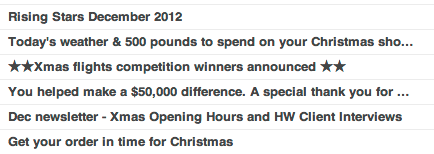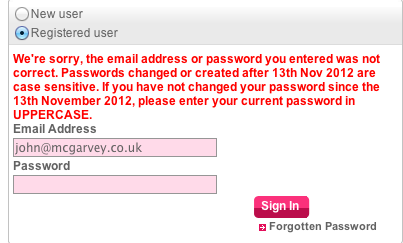They’ve tried filling email subject lines with CAPITAL LETTERS and personalising them with your name. Now I’ve noticed a new tactic from email marketers looking to boost the open rates of their email campaigns.
It’s to make their messages stand out in your crowded inbox by including special characters like stars, hearts and smiley faces in subject lines. And at first glance, it works.
I bet you notice the special characters here:

I’ve seen emails that use symbols representing the sun, an umbrella, a plane and more. There are lots of different symbols you can try and as statistics show they can help increase open rates, you can bet we’ll be seeing a lot more of them in the coming months.
But I’m not sure it’s a good idea to start using them willy-nilly in marketing emails. Here’s why:
- Like using ALL CAPITALS TO SHOUT or grabbing attention with horrific blinking text, special characters seem a little impolite. They don’t show the reader much respect. They attract eyeballs but don’t add extra information in themselves.
- It can be hard to get special characters to display properly across the wide range of software and services people use to receive email, adding extra complexity to your mailings. Broken emails just make you look silly.
- The phenomenon of banner blindness means people don’t pay attention to things that look like adverts online. As special characters become more widespread, users may start to ignore them in the same way.
Besides all that, there’s the question of taste. Special characters can look a bit, well, cheap. Like trying to entice customers into a run-down shop by playing music outside, or hassling people in the street to try your restaurant, you need to think about the image you project.
Do you want to be part of the crowd that screams ever louder for attention, or would you rather invest your time in more subtle, nuanced ways of attracting and keeping customers?
Now, I’m no expert in running trains, but you might have gathered from previous posts that I’ve had the odd run-in with train company web design, signs and labelling.
In general, it’s fair to say I’m not a fan. And now I’ve found another piece of nasty sticking-plaster copy lurking on the First Great Western website:

It seems the train company recently made its user password system case sensitive. In terms of security, this is a good move. But to accommodate the change, First Great Western decided to make everyone’s passwords all-uppercase.
If you don’t realise this when you try and sign in, you see this contrived error message:
We’re sorry, the email address or password you entered was not correct. Passwords changed or created after 13th Nov 2012 are case sensitive. If you have not changed your password since the 13th November 2012, please enter your current password in UPPERCASE.
The red text means it look like a serious error message, and it makes the user think they’ve done something wrong.
This is a classic example of a company making a well-intentioned technical change to its website, but forcing users to adapt to this change, rather than taking some extra steps to make life easier for them.
I call it ‘sticking plaster copy’ because it uses lengthy instructional copy to try and patch up the issue rather than fixing it properly.
Essentially, First Great Western has changed my password without asking. That’s inelegant and impolite. (It also raises the question of how securely user passwords are stored, but I’ll leave that issue to the technical experts.)
It makes my interaction with the website more awkward, adding an extra barrier that I have to overcome in order to buy a train ticket.
As an alternative, they could simply have allowed me to sign in as normal, then prompted me to change my password at a later point – perhaps immediately after signing in, or once I’d completed my purchase.
That would have made my life a bit easier, and it might even have positive impact on their website’s conversion rate too.
 Most of the people I work with are lovely. But every freelance web copywriter has encountered a tricky client or two – and I’m no exception.
Most of the people I work with are lovely. But every freelance web copywriter has encountered a tricky client or two – and I’m no exception.
Sure, sometimes, it’s these tricky clients that are most enjoyable to work with. Getting to grips with a complex product or working through a complicated brief can be highly satisfying.
But there are some things us web copywriters don’t like hearing from clients. They set the alarm bells ringing. Here’s why…
1. “Will you do this copywriting job for free?”
Usually, this question is followed by a promise that “if things go well”, there’ll be “lots of paid work to come.” Invariably, this is untrue.
The work that us web copywriters do brings significant benefits to our clients. As a result, we expect to be paid a fair fee. (There may be the odd time when you’ll get some free web copywriting. But don’t hold your breath.)
2. “It’s perfect. I just have to get sign-off from my manager. And the product manager. And the MD.”
Editing is an important part of the copywriting process. Often, constructive feedback and the subsequent changes are what transform a good piece of work into a great piece of work.
But that’s only possible when feedback is clear and unambiguous. If several people need to be involved in the approval and sign-off process, it’s best for them all to review draft content at the same time. Often, different people have very different views on what needs changing, so feedback needs to be consolidated and agreed.
Any copywriter worth their salt will help you with this. For instance, a conference call with key people followed by a quick email confirming the scope of changes can work wonders.
3. “Can we get those amendments back today?”
Usually, this request comes after a client has taken several weeks or months to send their own feedback to the writer.
It’s not that we don’t want to deliver, you understand. But in the same way that many clients are too busy to be able to review draft content immediately, good web copywriters won’t always be able to drop everything to hit a short-notice deadline.
(Depending on the project, I try to agree a clear schedule which includes dates for delivery of draft content, feedback and edits.)
4. “I’d write it myself, except I don’t have the time.”
I’m a professional writer, skilled at crafting content for the web that delivers tangible benefits to my clients.
I can help increase your sales, create a distinctive image for your business and talk to your customers in their language. And I want to work with clients who recognise me for those skills.
5. “No, I’m afraid we don’t sign contracts.”
I have been incredibly lucky with the clients I’ve worked with. Almost without exception, they pay up reliably and on time. Having heard many horror stories, I’m very grateful for this.
But I still get nervous when new clients aren’t willing to sign a copywriting contract or commit to anything more than a verbal agreement. A clear, simple contract protects both parties, and is one of the key foundations of a good working relationship.



 Most of the people I work with are lovely. But every freelance web copywriter has encountered a tricky client or two – and I’m no exception.
Most of the people I work with are lovely. But every freelance web copywriter has encountered a tricky client or two – and I’m no exception.